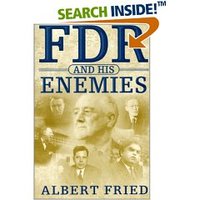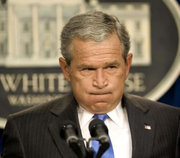One of the most important things you should do before reading any history book is to look at when when it was written. I’ve found that the great insights from most history books usually reflect that time, not the time being written about.
Here’s a good example, the 1999 book FDR and His Enemies, by Arthur Fried. It’s the best explanation I can find for why Al Gore isn’t President.
How so? Start with the title. FDR and His Enemies. It assumes the Nixon Thesis of Conflict, the idea that politicians must have enemies — implacable, evil domestic enemies who have to be confronted and destroyed before any success is possible.
That’s not true. The heart of the FDR Thesis of Unity argues against it. Roosevelt’s entire policy make-up was to create a consensus of belief that would spur people to action. He did this in the 1930s with radio, and he got Hollywood’s help, both then and later, in moving people away from their isolationist attitudes.
Second, look at whom Fried chooses. Al Smith. Father Coughlin. Huey Long.
John L. Lewis. Charles Lindbergh. All but one were Democrats. Smith was
Roosevelt’s mentor, Coughlin, Long and Lewis all benefitted from the
New Deal. What made them "enemies" for Fried was that the first three came to
disagree about the pace of change Roosevelt wanted — Smith wanted it
slowed while Coughlin and Long wanted it sped up, while the latter two
disagreed on entering World War II, along with most Americans.
This doesn’t make them "enemies." It makes them people with whom the
President had disagreements. Only one, Lindbergh, should count as a
true enemy in any sense of the term, and he was just an isolationist
who didn’t understand the threat Hitler posed until too late, again
like most Americans.
If FDR had enemies it were the great dictators — Hitler, Stalin, Tojo and Mussolini — as well as the Wall Street Republicans who were reluctant to act against poverty in the 1930s, and reluctant to act against fascism in the 1940s. It was the Republicans who voted against him, not the Democrats.
Yet when it came out this was quite the popular book. And it was
popular, I submit, precisely because it defined the past in terms of assumptions in its present. The idea that politics is a life-or-death struggle between
allies and enemies had become so ingrained in the popular consciousness
by 1999 that the bias was affecting everyone and everything. And since
the Nixon Thesis was the majority view, while the Clinton AntiThesis
was the minority view, it was thus inevitable that merely stating the
Thesis, standing by the Thesis, would lead the knees to jerk and
power to be seized.
This type of event — the preference of the moron for the genius, is the first sign of an excess in any generation.
- Benjamin Harrison was an empty suit next to President
Grover Cleveland, yet he beat the incumbent President in 1888 (thanks
to the electoral college) because the "bloody shirt" assumptions of the
Lincoln Thesis remained strong. - Warren Harding was an affable moron, yet he trounced Gov.
James Cox in 1920 — Cox later made his heirs billionaires and his
running mate was FDR himself. Why? Because the Republican Thesis
remained in place, and the knees jerked at the slogan "return to
normalcy." Normalcy, in this case, meant Republicans in power. - John F. Kennedy, for all his charms, was unqualified next
to Nixon in 1960, but he won anyway. Again, as in the case of Harrison
(and later, W) it was a narrow win. But the FDR Thesis, in the end,
held. The Eisenhower AntiThesis, which Nixon represented at the time, had no chance.
The pattern of Thesis, Validation, AntiThesis and Excess is
well-established in American history. Each generation goes through a
time of trial, and from that learns habits of a lifetime, which are
passed on to the next generation, and eventually found irrelevant by
events, leading to a new crisis.
A crisis is where we are now. The Nixon Thesis has no answers to Iraq, no answers to global warming. It fails to address the challenges of our time because it was never meant for our time. We need a new Thesis, a new set of Myths and Values, based on the new medium of our time, in order to address the future.
The idea that men who mostly supported FDR and benefited enormously
from him were, or had to be, his implacable enemies is proof positive
that by 1999 the Nixon Thesis was too ingrained in the American psyche
to be denied.
Al Gore never had a chance.











